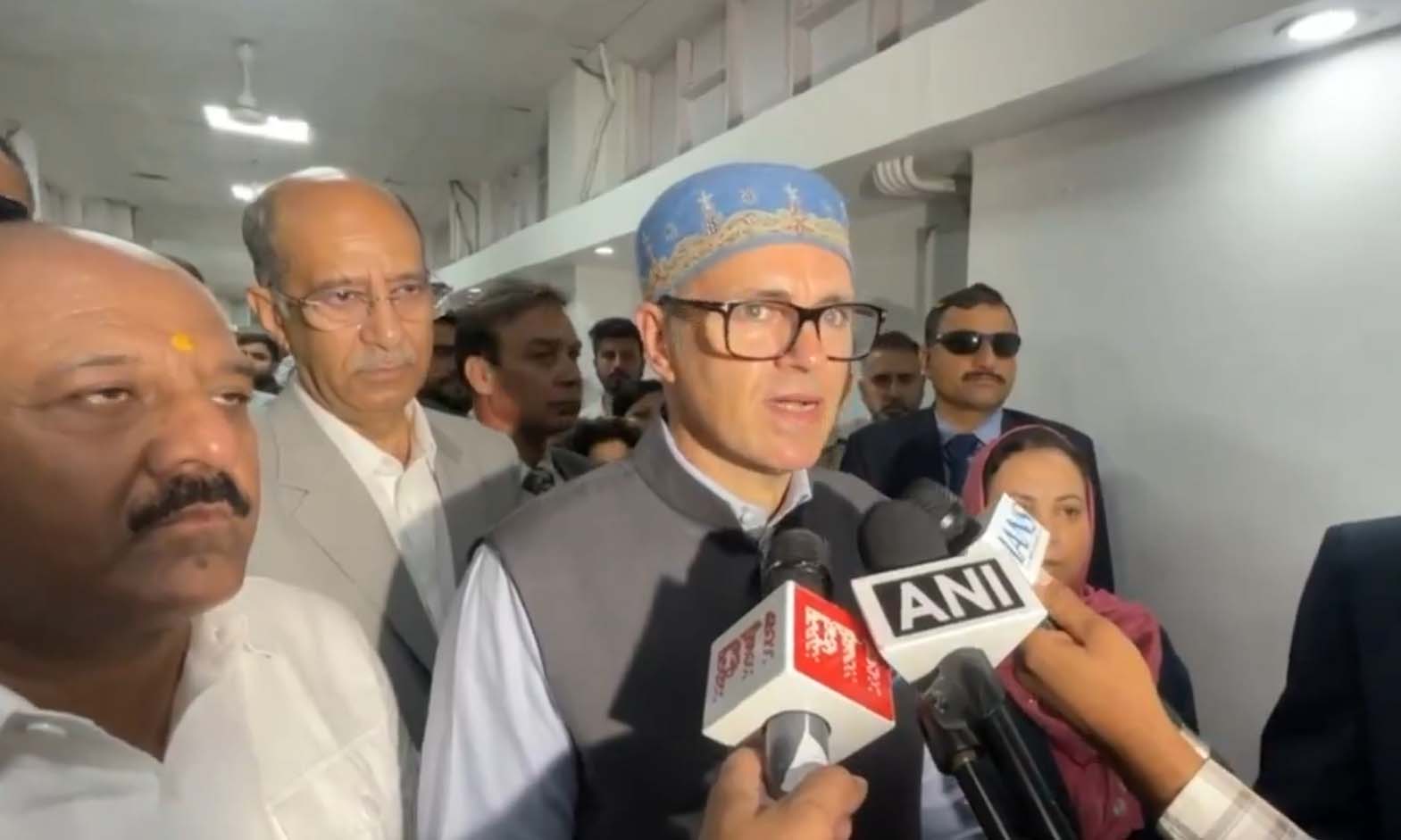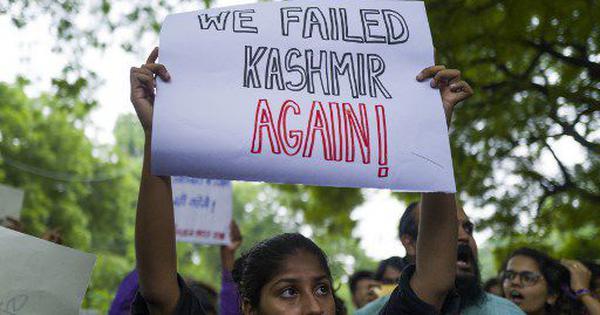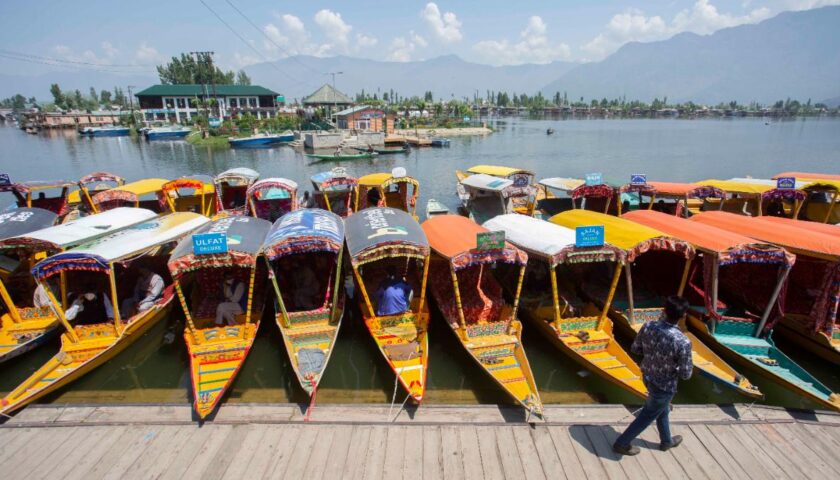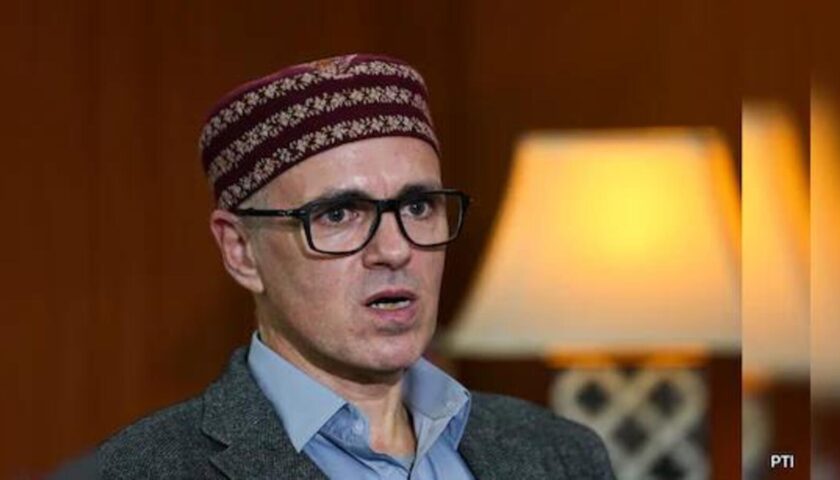Omar Abdullah has accused the BJP of hypocrisy, claiming the party embraces dynastic politics within its own ranks while using it as a political weapon to attack opponents.
By: Javid Amin | 03 November 2025
In a sharp intervention ahead of two key by-elections in the Union Territory of Jammu & Kashmir, Chief Minister Omar Abdullah mounted a pointed critique of the Bharatiya Janata Party (BJP), accusing it of embracing dynastic politics when convenient, while wielding the term as a weapon against opponents. The target: the BJP’s decision to field Devyani Rana, daughter of the late BJP MLA Devender Singh Rana, from the Nagrota assembly seat — a clear example, claimed Abdullah, of the party’s “double standards”.
But this is more than a single jibe. It is an attempt by Abdullah and his party, the Jammu & Kashmir National Conference (NC), to reframe a long-standing debate in Indian politics — dynastic succession — in the context of J&K’s electoral battleground. As the by-elections in Nagrota and Budgam (scheduled for November 11, 2025) approach, the stakes are high, both symbolically and strategically.
In this article, we unpack:
-
What exactly Omar Abdullah said and why
-
The immediate electoral context (Nagrota + Budgam by-polls)
-
The broader history of dynastic politics in J&K and India
-
The political calculations behind the BJP’s move and NC’s response
-
What this means for democratic norms, party culture and voter choice
-
Conclusion: Where do we go from here?
Omar Abdullah’s Accusation – What He Said and Why
The remarks
On 4 November 2025, speaking to reporters in Jammu, Omar Abdullah accused the BJP of “double standards” on dynastic politics. He said the party “has no qualms about dynastic politics within its party, but uses the term selectively when attacking rivals.”
Key quotes:
“They like dynastic rule if it’s in their party but see it only when it comes to families opposed to them.”
“One was our own seat (Budgam) and the other was one we lost in the last election. We are hopeful our performance will be better this time in Nagrota because the BJP has proved once again … it has no problem over dynastic rule when it is in their party.”
The target: BJP’s candidate choice in Nagrota
Abdullah’s criticism was rooted in the BJP’s decision to field Devyani Rana (daughter of the late Devender Singh Rana) in the Nagrota assembly by-poll.
Background: Devender Singh Rana, a two-time MLA from Nagrota (first with NC, later with BJP), passed away on 31 October 2024. Wikipedia+1 The by-election for Nagrota was scheduled for 11 November 2025. The BJP announced Devyani Rana as its candidate on 15 October 2025.
In choosing her, the BJP implicitly used a strategy of legacy‐succession — a standard feature in Indian politics but one the party has often publicly criticised when used by other parties.
Why Abdullah raised this issue now
A few motivations can be identified:
-
Electoral timing: With the by-elections in Nagrota and Budgam around the corner, the NC is keen to shape the narrative. By calling out BJP’s “hypocrisy”, Abdullah seeks to shift the debate from local issues to questions of political fairness and moral credibility.
-
Framing advantage: The BJP has long projected itself as opposed to dynastic politics — especially when attacking parties like the Congress or NC. Abdullah’s line of attack seeks to turn this around: if BJP is embracing dynastic politics, then its moral high ground is compromised.
-
Strategic depth: By focusing on dynastic politics, Abdullah wants to appeal to voters frustrated by perceived entrenched elite politics, and present the NC as a party standing for merit, fairness and principle (even if in practice it too has familiar names).
-
Pre-empting criticism: The NC may anticipate that the BJP will raise dynastic politics of other parties (including NC itself), so by going on the offensive first, Abdullah tries to seize the narrative and reduce the BJP’s effectiveness in that critique.
Fact-check and verification
-
The quote from The Tribune: “BJP has no qualms about dynastic politics within party, uses it to target others: Omar” confirms the wording of Abdullah’s charge.
-
The Indian Express article on Devyani Rana being BJP’s nominee gets the date, candidate background and rationale right.
-
The New Indian Express article on “Dynasties, women emerge as key forces in high-stakes J&K by-polls” makes clear that the Nagrota by-poll is being contested with legacy/dynastic elements.
Thus, the core facts of the accusation — BJP fielding Devyani Rana, by-election on 11 Nov 2025, Omar Abdullah’s criticism — are well supported in multiple sources.
The Electoral Context: By-Polls in Nagrota and Budgam
Why these seats matter
Nagrota (Jammu region)
-
The constituency number: 77 in Jammu & Kashmir Legislative Assembly.
-
Vacated due to the death of Devender Singh Rana on 31 October 2024.
-
The BJP had won this seat in the 2024 assembly elections (with Devender Rana). Now the by-poll gives them a chance to retain via his successor/ daughter. NC and other opposition parties see an opening.
-
The BJP’s choice of Devyani Rana signals reliance on the “sympathy + legacy” factor.
Budgam (Kashmir region)
-
The seat fell vacant because Omar Abdullah, who won from both Ganderbal and Budgam in the 2024 elections, retained Ganderbal and vacated Budgam.
-
The demographic mix in Budgam: A mixed Shia-Sunni constituency, making it politically significant.
-
The by-poll thus becomes a test of the NC’s strength in the Kashmir Valley, and the BJP’s foothold beyond Jammu.
Why the by-polls are high-stakes
-
They offer a litmus test for both major players: NC (which leads the government) and BJP (the principal national opposition/centre-right party).
-
Symbolically, they allow the NC to challenge BJP’s dominance in the Jammu region (Nagrota) and, simultaneously, check its own hold in the Valley (Budgam).
-
For BJP, retaining Nagrota (and making inroads in Budgam) could bolster the message that it remains electorally competitive even after its 2024 setbacks in J&K.
-
For NC and oppositions, winning these seats can generate momentum and narrative strength ahead of bigger electoral battles or legislative sessions.
The timeline and key dates
-
October 15, 2025: BJP announces Devyani Rana as candidate from Nagrota.
-
October 23, 2025: The New Indian Express reports on dynastic politics playing a key role in the by-polls.
-
November 11, 2025: Scheduled date of the by-polls for both Nagrota and Budgam.
Local dynamics in each seat
Nagrota
-
The BJP’s reliance on the late Devender Rana’s legacy: He had a strong local connect; the party hopes Devyani capitalises on that.
-
The opposition (NC) fields Shameem Begum (also spelled Shamim/ Shamim) from Nagrota. Opposition strategy: consolidate non-BJP votes, emphasise fresh leadership.
-
The BJP has to defend the seat; the NC has to deliver a performance better than its previous run.
Budgam
-
Several dynasty-linked candidates: The New Indian Express notes three from Aga Shia families (NC’s Aga Syed Mehmood; PDP’s Aga Muntazir Mehdi; BJP’s Aga Syed Mohsin).
-
Voting patterns: Shia‐Sunni mix means candidates must appeal across community lines.
-
For the NC government (led by Omar Abdullah), this is a chance to showcase governance and performance as the basis, rather than just legacy or personality.
Dynastic Politics in India & J&K: A Broader Look
What is dynastic politics?
-
At its core, dynastic politics refers to the phenomenon where political office, candidacy, or leadership is passed along familial lines — from parent to child, sibling to sibling, or among clan networks.
-
It can manifest in parties that favour “family names” as candidates, grooming next-generation leaders early, and leveraging family recognition and resources.
-
Critics argue that dynastic politics undermines meritocracy, entry for new leaders, internal party democracy and can lead to personalization of power. Supporters argue it offers stability, continuity and brand value.
Dynastic politics: A national pattern
-
Many parties, across regions and ideologies, have had dynastic leadership: often the Congress (with the Nehru-Gandhi family), regional parties (e.g., Samajwadi, DMK, RJD) and others.
-
It is not a phenomenon limited to one ideology or region — rather embedded in Indian democratic realities, where name recognition, family networks and legacy carry electoral weight.
-
Parties such as the BJP have publicly campaigned against the “dynasty culture” of rivals, using it as a rhetorical weapon.
Dynastic politics in Jammu & Kashmir
-
The politics of J&K has its own legacy of family-based leadership: the Abdullahs (Farooq, Omar, etc) with NC; the Muftis (PDP) etc.
-
In many constituencies, established families have deep local networks, patronage ties, and symbolic attachment.
-
The case of Nagrota (Devender Rana → Devyani Rana) is an example from the BJP side. The case of Budgam (with Aga families) is an example of legacy dynamics in the Valley.
The “double standards” critique
-
This is precisely the argument Omar Abdullah levies: that the BJP claims to oppose dynastic politics publicly yet willingly uses it within its fold when convenient.
-
The critique is: if dynastic politics is bad, it should be rejected across all parties; if accepted in one’s own party, the moral consistency suffers.
-
This resonates with voter perceptions of fairness and rule of law: is the rule the same for everyone or only for opponents?
The Political Calculus: Why BJP Embraces Legacy, Why NC Responds
BJP’s logic behind fielding Devyani Rana
-
Sympathy factor: After the death of Devender Singh Rana, there is often a sympathy wave for his family; choosing his daughter can tap into this.
-
Local connect + brand association: His tenure and recognition help provide a baseline. Devyani brings the family name.
-
Strategic retention: Nagrota is a Jammu region seat where BJP wishes to retain dominance; a legacy candidate reduces uncertainty.
-
Gender dimension: Fielding a woman candidate may also help broaden appeal. (The New Indian Express piece speaks of women and dynasties as key forces.)
NC (and Omar Abdullah)’s response logic
-
Narrative setting: By calling out BJP’s inconsistency, NC attempts to set the terms of the debate rather than react to BJP’s.
-
Appeal to merit/anti-entrenchment: NC positions itself as offering “new politics” or more fair governance (even though legacy exists there too) — but the rhetorical emphasis matters.
-
Mobilising sentiment: For voters tired of the “same families” or desiring change, the critique could resonate.
-
Undermining BJP’s moral campaign: If the BJP’s campaign emphasises change/new leadership, highlighting dynastic choices weakens that message.
Risk and trade-offs for each side
-
For BJP: The risk is that voters who dislike “family politics” may view this choice negatively; also gives NC ammunition.
-
For NC: While attacking dynastic politics, NC must ensure its own leadership does not appear hypocritical (given its own legacy). Also, focusing on narrative shouldn’t substitute for local issues or governance concerns.
-
For both: Local ground issues (jobs, development, security, resettlement) remain crucial; legacy alone may not win votes.
Implications: Democracy, Voters and Party Culture
Voter perspective: what this means on the ground
-
Agency and choice: Voters may ask — am I being given a choice between genuine candidates or just family names?
-
Recognition vs. renewal: Legacy candidates bring name recognition, but renewal may be desired by younger voters seeking new leadership or fresh faces.
-
Credentials and performance: Ultimately, candidates will be judged on what they deliver. Legacy may open doors but sustaining support requires performance.
-
Narrative fatigue: If many seats are contested among family networks, voters may feel politics is exclusionary.
Party culture and internal democracy
-
Legacy candidacies reflect how parties distribute tickets, groom successors and manage internal democracy.
-
If ticket allocation is heavily skewed towards family members, it may discourage grassroots leadership.
-
Public critique of dynastic politics by one party while practising it creates a credibility gap.
Democratic norms in J&K context
-
In a politically charged region like J&K, where issues of statehood, security, identity and development overlap, the legacy debate has extra weight.
-
For instance, if voters see legacy politics overshadowing local needs (jobs, infrastructure, governance), legitimacy gets strained.
-
The by-polls thus serve as a micro-test of how much legacy vs local issues matter in J&K’s evolving politics.
Bottom-Line: The Road Ahead
As the 11 November by-polls approach, the spotlight is on how voters in Nagrota and Budgam respond: will they prioritise legacy and party brand, or new faces and fresher narratives?
For Omar Abdullah and his NC, the tactical move to call out the BJP’s “double standards” sets a high rhetorical bar. But narrative alone won’t suffice; the ground realities — delivery of governance, responsiveness, local issues — will ultimately matter.
For the BJP, the choice of Devyani Rana places emphasis on legacy and continuity. But the party will need to convince voters that this is not merely succession politics but that the candidate can perform and serve.
Finally, this episode underscores a broader question in Indian politics: do we continue to accept family-based succession as normal, or should we push for more open, competitive pathways into politics? The voters of J&K, in these by-polls, will offer one answer.




